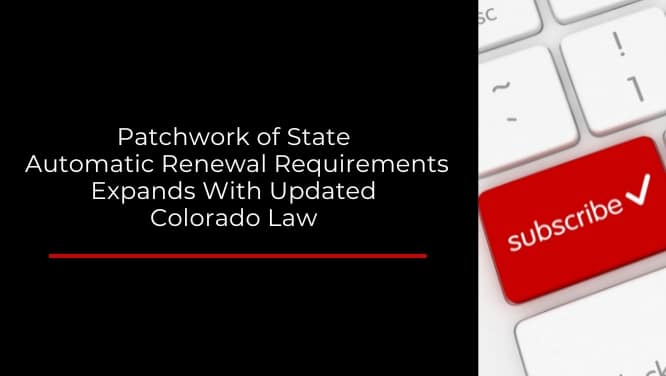New Year, New Vacation Policy? What Colorado Employers Need to Know

- Brad L. Schoenfeld
- |
- February 14, 2020
In a tight labor market, it’s often the benefits and perks that help employers compete for talent. One key benefit an employer must consider is vacation. Should vacation be offered, and if so, how much and how should it be structured? What’s the real value of vacation to employees and what’s the cost to employers? In the last few years, the state of Colorado’s guidelines around vacation pay, and who owns this time when an employee leaves, have changed or been interpreted in a number of different ways.
As we kick off the new year, Colorado companies should consider these recent updates on the state’s vacation law as they revisit and refresh their benefits packages and employee handbooks. For employers, it’s important to understand the latest rules around vacation pay to ensure compliance and to balance the value of providing employee benefits with the financial risk to companies.
Why the confusion?
In December 2019, the Colorado Department of Labor and Employment (CDLE) issued a clarification to the vacation rules, stating that under no circumstances could an employer fail to pay out accrued but unused vacation leave to exiting employees, regardless of any agreement to the contrary between the employer and employee. This clarification was made in direct response to the June 2019 Colorado Court of Appeals decision in Nieto v. Clark’s Market (Colo. App. 2019). In the Nieto case, the court ruled that “an employee’s right to compensation for accrued but unused vacation pay depends on the parties’ employment agreement.” This decision, which is currently under appeal, was contrary to the CDLE’s prior interpretation of the Colorado Wage Act, and accordingly, in the months following the Court of Appeals ruling, the CDLE held a rule-making process to consider the legislative debate around the intent of a 2003 law on vacation accrual in order to determine how to clarify the rule going forward.
What do employers need to know now?
Colorado employers are not required by law to provide workers with paid vacation, but if an employer offers vacation, all vacation time is considered wages or compensation under the Colorado Wage Act. The CDLE’s recent clarification reaffirmed that employees’ earned vacation benefits cannot be forfeited. That means that when an employee leaves a company, regardless of whether the employee quits or is fired, all accrued but unused vacation must be paid out to the departing employee. It also means that “use it or lose it” vacation policies, under which an employee forfeits his or her earned vacation if such vacation time is not used by the end of a year or before an employee’s employment ends, is invalid under Colorado law. Moreover, these rules apply despite what a written agreement, policy or employee handbook may say.
Tips for Colorado employers
While the updated Colorado vacation rules do not allow for the forfeiture of any accrued but unused vacation time, employers still have the discretion to determine how vacation is earned and administered. To that end, there are a number of things an employer can do to limit its exposure for paying out significant amounts of unused vacation time. A few strategies to consider include:
- Never have vacation accrue all at once (e.g. at the start of the year or upon the first day of employment). Instead have vacation accrue proportionately over a period of time.
- Put a ceiling or cap on the accrual of vacation so that an employee stops accruing vacation once the cap is hit – the employee will need to use vacation in order to get below the cap and start accruing again.
- Offer no vacation, which some people refer to as “unlimited vacation” under which employees are expected to meet the performance requirements set by the company and are permitted to take time off so long as such requirements are met and their absence from work does not materially interfere with the company’s business.
Vacation policies need to be carefully written to ensure compliance with applicable law. For this reason, the CDLE recommends that if employers choose to provide vacation as a benefit for employees, employers should “develop their vacation policy in consultation with legal counsel.”
It’s also important for employers to note that the current Colorado vacation rules do not expressly apply to paid time off (PTO) or sick time. For this reason, many believe that PTO and sick time fall outside of the CDLE’s rules, however, this remains unclear and is likely to be addressed by the courts or the CDLE in the near future.
Businesses also face other regulations
Colorado employers are facing several other changes to state regulations, including an increase in the statewide minimum wage, a new hourly overtime rule which will take full effect by July 1 and, potentially, an upcoming paid family and medical leave program. Employers in many industries will be impacted by these new regulations and will need to revisit their compensation, staffing and scheduling practices. Subscribe to our monthly newsletter to keep up with the latest on these topics and other legal news.
Brad Schoenfeld is a partner at Koenig, Oelsner, Taylor, Schoenfeld & Gaddis PC (KO Law Firm), an innovative corporate and commercial law firm with a team of experienced lawyers and a practical, efficient, business-focused approach. Founded in 2003 on the philosophy that a different approach delivers better value, our business-first legal and industry expertise helps established brands and emerging companies achieve meaningful business outcomes. KO is headquartered in Denver and Boulder, Colo., and serves the software and SaaS, retail and manufacturing, professional services, energy, food, beverage and consumer goods, eCommerce and internet, healthcare and life science and ancillary cannabis industries. Reach Brad at [email protected].




